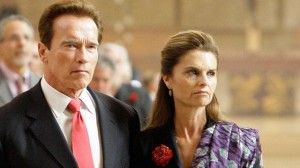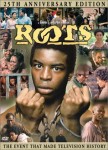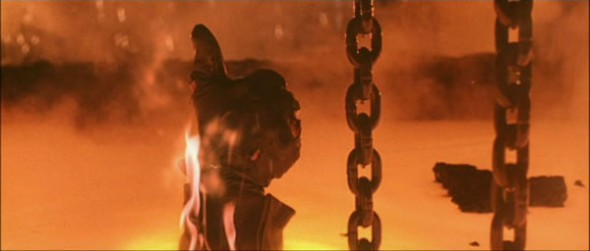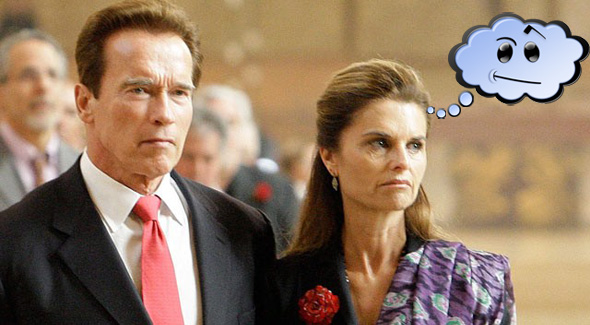
Arnold/Maria, before this whole mess blew up.
It would be redundant if I were to recap or report on the various expressions of disappointment and outrage over recent revelations of Arnold Schwarzenegger’s infidelity, and I wouldn’t be overthinking it if I were to merely add my own disappointment to the chorus of woes. Yes, I am a big Arnold fan…no, let me restate that. I am a big fan of the movies of Arnold (more on that distinction later), and I too feel a great sense of disappointment over this news and sadness for the Schwarzenegger family as they endure the harsh public spotlight in this time of personal struggle.
So what’s a bummed-out, overthinking Arnold fan to do?
Why, get to the analytical chopper and parse out the implications of this incident, of course.
So what does it mean to be a fan of someone’s work, rather than a fan of that person? Is such a distinction even possible?

Vincent Van Gogh/Crazy Person
Let’s use a highly reductive example as a straw man starting point. Vincent Van Gogh is regarded as a master (of painting), and his works are known throughout the world as shining examples of human artistic achievement. But Vincent Van Gogh, the man, suffered from mental illnesses and was likely not a pleasant person to be around. He’s not the type you’d want your kids hanging around, and his life is certainly not the type you’d want to emulate, even if you wanted to be a great painter.
Now, I’m not saying Arnold Schwarzenegger is the Van Gogh of acting. But let’s use this as an analogy for the sake of the argument. Actually, I will say that Arnold’s on-screen personas in the roaring action movies of the 80’s and 90’s is as significant a contribution to film as Van Gogh’s impressionist paintings were significant contributions to art. And that’s where the analogy falls apart. Van Gogh was held in little esteem outside of his artistic output. Arnold, on the other hand, had a compelling personal life story: a true rags-to-riches American Dream rise to power that many would have deemed worth of emulation, whether or not they wanted to be actors or politicians.

Levar Burton/Kunta Kinte
The main problem with this comparison is that acting and painting are two totally different things. Acting, above all other professions that create so-called “role models” (sports, in particular), blurs the line between being a fan of someone’s work and being a fan of that person. Although they play characters on screen, their bodies are the vessels for those characters, the transmission method by which we, the audience, experience the words, laughs, cries, and tears of heroes like Kunta Kinte, Luke Skywalker, and The Terminator. In other words, the gap between the performance and the actor delivering the performance is so much smaller than the gap between a painting and the painter, a designer dress and the designer, a computer and the egomaniacal CEO of the computer company, etc. etc.
That is to say, if Steve Jobs were caught fathering a child of wedlock similar to what Arnold did, I doubt millions of Apple fanboys would suddenly look upon their iDevices and MacBooks with disgust and change their longstanding relationship with the corporation that is the direct fruit (pun intended) of Jobs’ labors.

Arnold/The Terminator
But Arnold is an actor, and his corporeal being–his face, his voice, his body–is essentially his one and only product. It is the one persona that flows out of his acting performances and into his public life. When we see the square jaw and steely gaze of Arnold the person, we see the square jaw and steely gaze of Terminator. When we hear the commanding, Austrian accented voice of Arnold the Governor saying “I’ll be back” or “Hasta la vista, baby,” we hear the commanding, Austrian accented voice of The Terminator.
In a way, Arnold is a victim of his own success at defining and dominating a peculiar niche of acting: the oddly accented, immensely built, unrelenting yet humorous tough guy. Those attributes all carried over well into his public and political life, so why would he bother separating his personas depending on the context?
Why bother coming up with new political slogans when your old action movie lines work just fine?
Why bother putting away the huge knife on your desk before filming a message?
Arnold made this bed, and now he’s forced to lie in it. As he struggles with the personal and legal fallout from this incident, his comeback film and TV projects–everything from an animated kids show to future Terminator movies–are all officially on hold and unofficially in serious jeopardy.
Arnold, the Terminator, the Governator, and now, the Cheating Father of a Love Child: they are all one and the same.

If there's any good thing to come out of this mess, perhaps it's that this animated kids show, "The Governator," won't get made.
So where does that leave us fans? If Arnold has rolled up all aspects of his persona into one, and he commits a vile act in his personal life that has already had consequences on his future film and TV life, how are we supposed to react?
Let’s use another highly reductive, straw-man example to start: as an Arnold fan, I could treat Arnold the actor with the same level of contempt that Arnold the cheating husband gets. I could throw out my Terminator DVD collection, my “Governator” T-Shirt, and unequivocally renounce my Arnold fandom in as many public forums as possible: Facebook, this website, LinkedIn (true story: I had a reputation as being a huge Arnold fan at my old job and even incorporated quotes from his movies in my farewell speech), Time Square, etc. If Arnold ever makes it back to movies, I would never watch them, and I would tell my friends not to see them, lest they be in league with a cheating scumbag.
But this is both undesirable and unjustified. It’s undesirable because I still love the Terminator movies–and Arnold’s performance as the titular character. And it’s unjustified because Arnold’s recent actions do not in any way invalidate the artistic achievement of Arnold, James Cameron, Linda Hamilton, Brad Fiedel, and countless others who, decades ago, came together to make two science fiction movies that are still regarded as exemplars of the genre.
In other words, a reputation can’t travel back in time to terminate a movie.
But reputation does change the context of our culture, and that’s obviously important when you’re analyzing (much less Overthinking) pop culture. Take a moment and watch a portion of this video. You may have seen it before; it’s a compilation of 160 quotes from Arnold’s long and eclectic movie career.
Now, a simple question: has the entertainment value of the above video, which we all agree to be very high prior to this incident, decreased in any way because of this incident?
At first, I wanted to say no, it hasn’t. The lines, which were hilarious/awesome/awesomely bad at the time of their writing & delivery, haven’t changed, and the movies that they came from haven’t changed. These lines and these movies earned decades worth of pop culture equity, and there’s no taking that away.
At least, not entirely. The current context of the scandal is not nearly enough to take away that equity, but it is enough to eat into it a little bit. The aforementioned inseparability of Arnold’s personal and professional personas makes it impossible to watch Arnold without thinking of his recent misdeeds, and, well, that’s not as much fun as watching Arnold without knowing all of this.
So what’s an Arnold fan to do, if foreswearing Arnold completely and ignoring his faults completely aren’t options? Although Arnold has staked his entire career on a singular persona that runs common to his personal and professional lives, we as fans have no choice but to go against Arnold’s plans and separate the two.
It’s a sad thing to do. The fantasy that Arnold cultivated–that this unstoppable Übermensch from the movies actually existed in our lives and was a real force for good–was enormously appealing, and we all bought into it, perhaps a little too much. Like so many other simple truths that we clung to in order to make sense of our complicated lives, this one has proven to be false. We’ll find other ones to replace it, but this one is gone and can never come back. We can still watch and enjoy Terminator or True Lies, but it won’t be with the same sense of naïve awe or entertainment that we used to have. Arnold will probably come back from all of this to make movies again, and I’ll probably go see it just for him, but it won’t be with the same sense of childlike giddiness that the purest forms of entertainment evoke.
I guess that’s what we’re losing: this sense of Arnold, both the man and the roles that he played, as one of those few remaining pure forms of entertainment.
Farewell, Old Arnold. When you come back as a New and Different Arnold, it won’t be the same, but at least we’ll have the memories.


This is really interesting. I wonder, with painting… I agree that it’s relatively easy to separate Van Gogh the artist from Van Gogh the person. But I suspect that there are visual artists for whom that is not as true. Like, if it came out that Norman Rockwell had a half-dozen illegitimate kids, that would matter, right? Or if Andy Warhol… and here I’m trying and failing to think of a vice that would tear down, rather than further reinforcing, the particular persona Warhol so carefully constructed. But you get the idea. (Of course, both of these are rather special cases. In general, I think the distinction you make is spot-on.)
Example of painter greatly tied to persona, Thomas Kinkade http://www.examiner.com/pop-culture-in-cleveland/thomas-kinkade-painter-of-light-arrested-for-dui
I can’t help but notice the pop up on the bottom of my screen recommending reading a piece on Woody Allen. In case you forgot, Woody married his quasi step daughter. That seems much more socially and personally unacceptable than knocking up the help. (Neither are ok, of course.)
I don’t have a hard time watching Woody Allen’s movies now, I do have issues where he is acting alongside a younger woman. I imagine as long as Arnold makes movies where he’s just killing badies, and not romancing the help, I will be able to see past it. But knowing Arnold, he will probably try to make some lame pun when he walks past a maid or nanny in whatever movie he makes next.
I wonder; if Arnold died suddenly and somewhat unexpectedly, would he get the same sort of immediate image rehabilitation Michael Jackson (King of Pop/convicted-in-media child molester) underwent?
I think a part of it is how much of the performance serves to remind the audience of the misdeed. You can listen to Jackson’s tunes and easily forget what he was accused of (or in the case of “Billie Jean”, find it ironically humorous). If Arnold’s older performances come across as misogynist, it’ll probably be harder to forgive him.
I mean, Kanye West fans pretty much have to reconcile his public image of egotistical jackass with his output of artistic musical and lyrical genius (actually, Kanye kind of reconciled that himself with his last album). In fact, nowadays, I kind of think that’s the stepping stone into Kanye West fandom. Most people I know hated Kanye West before I forced them to listen to his music.
This is an interesting take. I think actors do tend to embody who we like them to embody more, but I don’t totally agree in terms of its effects. Billionaire Hollywood actors have affairs all the time. Brad Pitt is now with Angelina Jolie – who he worked with on a set – and split with Jennifer Aniston, in a very public “infidelity”. The reason it’s different with Arnold is because he’s a politician, and that now colors his acting career as well. That’s the risk he took when he connected the two. Actors (Charlie Sheen, for example) can sometimes even build off of bad press. They’re not expected to be moral or stable, just entertaining. The trick with Arnold is that he’s supposed to be an example because that’s the level that governors are held to. I would say artistically he could still go places – politically, he’s taken a very serious hit.
I described in the article how Arnold’s “Terminator” persona bled into his public persona, but let me take it one step further:
Because Arnold is The Terminator, he’s relentless and super-strong. But he’s also a cyborg who doesn’t have the capacity for indiscretion, especially…sexual…indiscretion.
Hear me out on this. I think that we, as a public, subconsciously equate Arnold and The Terminator. This de-sexualizes him to some degree, or at least helps counter the rumors of his excessive womanizing.
“How could he be a slut? He’s The Terminator. The Terminator doesn’t have sex. OK, he’s married to Maria Shriver and has kids, so I guess he has sex with her. But that’s it. It’s part of his Terminator programming or something. Infidelity does not compute.”
This is obviously open for debate, but I think there’s a little truth to this idea.
Oh you guys are ridiculous. His personal sexual history is something that you should just not care about period. No one’s perfect. It’s between him and his wife. Also, let’s not say that all adulterers are equal. John F Kennedy, for example, basically spent 80% of his time thinking about how to have sex with as many people as possible. Bill Clinton was a philanderer all over the place. One misdiscretion is a lot better than that. But, let me restate, let’s stop judging people based on these things.
He was impressive as a Governor and it’s even more impressive that he never let this stuff distract us while he was in Office. That he managed to keep it under his hat for his entire term means that he never involved it to interfere with his service to the state of California so as far as I’m concerned, it’s completely off the record books if you’re judging him as a Governor
How has there not been a ‘lamentations of the women’ joke yet?
This was interesting to watch as it played out in Hollywood during the Roman Polanski scandal, where people were signing petitions for him and saying how he was so brilliant and it was a different time and all that.
He is brilliant, but he’s also a rapist scumbag. People are strange, complicated creatures. One can both be extremely talented, greatly contributing to art and film history, and also be a bad person who hurts other people and commits heinous crimes. These are not mutually exclusive.
I think Roman Polanski is a shithead, but I’m still going to watch his movies and enjoy them.